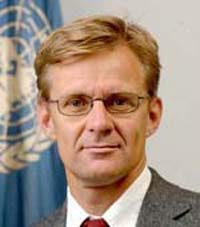Darfur can face catasrophe without stronger peacekeeper force, U.N. humanitarian chief says

"We either get good news in the next few weeks, or we have catastrophic news later," Jan Egeland told The Associated Press in a telephone interview
He said a major international conference would be held in June somewhere in Europe in an effort to boost humanitarian aid and assistance for the peacekeepers.
Egeland was in Brussels to meet top officials at NATO and the European Union. He said military powers should provide more resources to improve transport, communications, logistics, training and planning for the African peacekeepers. "They represent hardware which is very valuable," he said.
However, he warned against deploying a Western military force, as some politicians in the United States have suggested.
A 7,300-strong African Union force in place in Darfur has been largely unable to halt violence despite a May 5 peace deal designed to end fighting that has killed nearly 200,000 people and displaced 2.5 million since 2003.
NATO and the EU have provided airlifts, training and other backup for the peacekeepers and have offered more help to bolster the AU troops before they hand over to a U.N. force in September.
Egeland said the Africans need more trucks and helicopters to move around the vast region. He said African nations also needed to provide more and better-trained troops and said the African Union should urgently revise the force's mandate so it could better protect the local population.
"The African Union force has to be strengthened, it's them that we have to empower," Egeland insisted. "What can be provided by military organizations, by member states of the UN and NATO is very welcome."
He painted a grim picture of the situation despite the peace agreement which raised hopes of an end to Darfur's woes.
Egeland recently told the U.N. Security Council that the number of displaced people in South Darfur had tripled in the last four months to between 100,000-120,000. He complained local officials have blocked fuel deliveries and the movement of aid workers has been severely restricted.
In addition, areas of eastern Chad that border Darfur have been engulfed in turmoil, Egeland said. Aid groups have been forced to cut back staff and relief work because of insecurity and funding shortfalls.
Egeland said his talks at NATO and the EU would also look at the wider use of the military to help in humanitarian situations. He said military units had been very helpful during the Asian tsunami, last year's earthquake in Kashmir and the latest deadly quake in Indonesia, the AP reports.
Subscribe to Pravda.Ru Telegram channel, Facebook, RSS!





